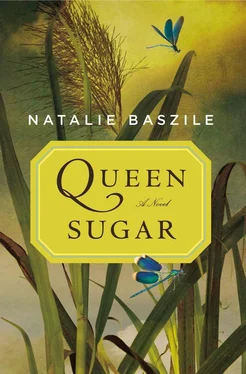With Alison on board, their productivity had skyrocketed. One brilliant morning last week, they fertilized the back quadrants, and yesterday, under an enamel blue sky, they pulled the cutter through some of the coco grass that kept the cane from suckering.
At the table now, Denton peeled a shrimp and squinted out at the salt flats in a way Charley had come to know. “An idea came to me last night,” Denton said, quietly. “I think we ought to pay eight dollars for common labor come grinding.”
Alison drained his beer and snapped his fingers for the waitress to bring him another. “Going rate’s seven and a quarter. You got money to give away?”
“We offer seven and a quarter,” Denton said, “we’ll be up against every farmer out there. Won’t have nothing to set us apart.”
“Hell, Denton, how much different we need to be? A black chick from California, an old black has-been, and a broken-down white dude? We’re like freaking Barnum and Bailey as it is— Jesus Christ .”
Charley winced. It had been a month since Alison signed on, and she still hadn’t gotten used to his frank appraisals and candid observations.
“In a way, that’s what I’m talking about,” Denton said. “It hurts me to say this, Miss Bordelon, but I’ve come to know it’s true. The white man’s ice is always colder.” He paused for a moment. “Say you hire a man for grinding, tell him you’ll pay same as the white man’s paying. You give him an hour for lunch where the white gives him fifteen minutes, works him all day. You tell him all the ways you’ll treat him better and he’ll look you in the eye, shake your hand, and say he’s coming to work for you. But come October first, you look up and he’s gone to work for the white farmer down the road.”
“Shit,” Alison said. “I never knew that.”
“I didn’t either,” Charley said, “but I’m not surprised.”
“Now, we pay eight,” Denton said, “we got a chance. We pay eight, men will come and they’ll stay.”
Alison tossed his cap on the table. “Denton, how’s Miss Bordelon going to pay extra for labor when she barely has enough money for plant cane? LSU’s charging three hundred a ton for the new variety. We’ll be lucky to afford enough for ten acres.”
But Denton had already taken his pen from his bib pocket and folded his napkin over. “Here’s how.” In his shaking hand, he drew a line from one end of the napkin to the other. “We tell ’em up front: you don’t miss work, you get eight. You don’t quit halfway through, you get eight. You get sick or need to go to a funeral, you get eight. Long as you stay to the end of December, you get eight dollars an hour.” He looked up to make sure they were following. “Now, when grinding starts, we pay them seven and a quarter, every two weeks, just like everyone else. Come January we pay the seventy-five cents extra. The ones who keep their word can collect.”
Alison leaned back scratching his head full of straw. “Damned, if that ain’t the best idea I’ve heard in months. Where’d you get that from?”
“I come up with it last night,” Denton said, modestly, “lying in my bed.”
“Brilliant,” Charley said. It was one of the things she admired most about him — his ability to puzzle through a problem and come up with not just any solution, but the right solution, to make all the other pieces fall into place. With Denton’s plan, Charley realized, she could hire good workers and still afford fertilizer and plant cane.
Alison squeezed Denton’s shoulder tenderly. “Man, Denton. If I didn’t know better, I’d swear you were a freaking genius.”
Charley looked at her two partners seated across the table, and rested her chin in her hands as a swell of gratitude and affection washed over her. Alison was right. The three of them were a sideshow, but she wouldn’t trade their company for anything. As far as she could tell, they were beating the odds, if only just by a nose. In less than four weeks, they had whipped most of her fields into shape, almost eight hundred acres. They’d dug more ditches, cleaned more drains, had more arguments, and eaten more five-dollar lunches together than she could count. But come October, God willing, her cane would be ready for grinding.
And then it was time for Alison’s daily lecture. To look at his uncombed hair and dirty fingernails, Charley would never have guessed he had a PhD in agriculture and an MBA from LSU. But Denton swore it was true. Today’s class was a history lesson: Louisiana Sugarcane’s Founding Fathers.
“Did you know,” Alison began, “that in the 1790s, when Louisiana still belonged to Spain, farmers grew maize, rice, tobacco, and cotton? There wasn’t a single stalk of sugarcane anywhere in the region. Their main staple was indigo.”
“Indigo?” Charley set her beer on the table and imagined barefoot Bengalis straddling boiling vats, Gullah women in the South Carolina low country up to their elbows in blue dye.
But Alison said, “Yes, indigo, until 1794, when worms and damp weather destroyed their crops and drove most farmers out of business. The next year, on a plantation that is now Audubon Park in New Orleans, Étienne de Boré, planter, entrepreneur, and visionary, gambled his fortune on sugarcane. He figured out how to turn sugarcane syrup to crystal on a commercial scale.”
And somehow, hearing that men and probably a few women had struggled with sugarcane for centuries and that the crop’s history reached across the Atlantic to Cuba, Santo Domingo, the West Indies, and Brazil, Charley felt as though she were part of something larger, a worldwide movement. People had fought over sugarcane and died for it. They had married for it, prayed over it, and cursed its existence.
And then lunch was over. Denton and Alison wiped their mouths and balled up their napkins, while Charley cleared their baskets. And when she returned to the table, she saw that, for once, they both looked relaxed, their faces not etched with the permanent frowns that came with being cane farmers.
“You guys are the best,” Charley said, overcome again. Because, for once, it had been a good day, and at least for a few hours there was nothing she wanted more than to be a cane farmer, and there was nothing more satisfying than sitting down with her partners over baskets full of peel-and-eat shrimp and washing it all down with a cold beer.
Every day around four fifteen, cicadas fell mute in the stifling heat, the cane grew eerily still, the sky, almost colorless all afternoon, turned to slate, the clouds from white to battleship gray. Thunder rumbled. A rush of wind. And within minutes rain fell in opaque sheets, the half-dollar-size drops exploding against the shop’s tin roof so loudly Charley could barely hear the radio. Whatever fieldwork remained would have to wait.
It had rained for twenty minutes when Charley, sifting through a stack of new invoices, heard a truck pull up. Denton’s dogs, which he’d left behind to keep her company, started barking. It couldn’t be Alison, who left at three to retrieve his grandsons from day care, but it might be Denton, back from Lafayette, where he’d driven for an order of discs.
But Denton’s dogs kept barking, and soon Charley heard a man’s voice calling, “Mr. D.? Anybody here?”
Charley went to the office door. It was Denton’s friend from the auction, the one who’d helped load their winnings onto the gooseneck trailer. “Come in, come in.”
He stepped into the office, stamped his feet. “Man, I tell you,” he said, brushing rain off his baseball cap, “it’s coming down sideways.” He wore the farmer uniform — T-shirt, dusty jeans, and boots — all of it darkened with rain.
Charley struggled for his name. “It’s Ramon, right?” She’d been so embarrassed the day of the auction, she hadn’t said much more than “thank you.”
Читать дальше












